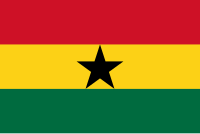 The Republic of Ghana is a country located in West Africa. It is bordered by Côte d’Ivoire (Ivory Coast) to the west, Burkina Faso to the north, Togo to the east, and the Gulf of Guinea to the south. The word Ghana means “Warrior King” and is derived from the ancient Ghana Empire.
The Republic of Ghana is a country located in West Africa. It is bordered by Côte d’Ivoire (Ivory Coast) to the west, Burkina Faso to the north, Togo to the east, and the Gulf of Guinea to the south. The word Ghana means “Warrior King” and is derived from the ancient Ghana Empire.
Ghana was inhabited in pre-colonial times by a number of ancient predominantly Akan Kingdoms, including the Akwamu on the eastern coast, the inland Ashanti Empire and various Fante and non-Akan states, like the Gaand Ewe, along the coast and inland. Trade with European states flourished after contact with the Portuguese in the 15th century, and the British established the Gold Coast Crown colony in 1874.
The Gold Coast achieved independence from the United Kingdom in 1957, becoming the first sub-Saharan African nation to do so and the name Ghana was chosen for the new nation to reflect the ancient Empire of Ghana, which once extended throughout much of west Africa. Ghana is a member of the South Atlantic Peace and Cooperation Zone, the Commonwealth of Nations, the Economic Community of West African States, the African Union, and an associate Member of La Francophonie. Ghana is the second largest producer of cocoa in the world and is also home to Lake Volta, the largest artificial lake in the world by surface area.
Gold-seeking Mande traders arrived by the 14th century and Hausa merchants by the 16th. During the 15th century the Mande founded the states of Dagomba and Mamprussi in the northern half of the region. The Asante (Ashanti), an Akan people, originated in the central forest region and formed a strongly centralized empire that was at its height in the 18th – 19th century. European exploration of the region began early in the 15th century, when the Portuguese landed on the Gold Coast; they later established a settlement at Elmina as headquarters for the slave trade.
By the mid-18th century the Gold Coast was dominated by numerous forts controlled by Dutch, British, and Danish merchants. Britain made the Gold Coast a crown colony in 1874, and British protectorates over the Asante and the northern territories were established in 1901.In 1957 the Gold Coast became the independent state of Ghana. Since independence several political coups have occurred, but the coup of 1981 produced a government that lasted into the 1990s and made a smooth transition into another administration at the beginning of the 21st century.
Ghana is an ethnically diverse country; thus, Ghanaian culture is a mixture of all its ethnic groups, the Ashanti, Fante, Akyem, Kwahu, Ga, Ewe, Mamprusiand Dagomba, among others. It is most evident in Ghanaian cuisine, the arts and clothing. The celebration of festivals in Ghana is an essential part of Ghanaian culture and there are many of them such as the Homowo, Odwira, Aboakyer, Dodoleglime, Hogbetsotso, Tedudu, Deza (festival) and Sandema among others. Several rites and rituals are performed throughout the year in various parts of the country, including child-birth, rites of passage, puberty, marriage and death.
Ghana’s economy is predominantly agricultural, with 60% of the population engaged in subsistence agriculture. The biggest cash crop is cocoa. Rice, coffee, cassava, peanuts, corn, shea nuts, and bananas are also widely grown. Fishing and lumbering are important, although inadequate roads and facilities have hindered the development of the timber industry.
Minerals (most importantly gold, but also industrial diamonds, bauxite, and manganese) are found in the north, south, and coastal regions. There is some offshore petroleum exploitation, and exploration for additional reserves identified significant deposits in 2007.
The major industries in Ghana are mining, lumbering, light manufacturing, aluminum smelting, cocoa and other food processing, and shipbuilding. The major exports are gold and other minerals, cocoa, timber, and tuna. Imports include capital equipment, petroleum, and foodstuffs. The Netherlands, Nigeria, Great Britain, the United States, and China are Ghana’s major trade partners. The country has a large but poorly maintained road system; rail lines connect the major centers in the south.
Notes from Wikipedia and Answers.com









